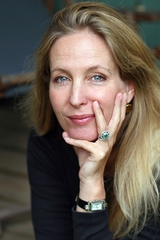
“Where does it all come from?” runs that favourite query of literary festival audiences. “Where do you get your ideas and your inspiration?”
Oh dear, I’ve always dreaded that question. I can answer anything, literally anything at all, about the writing process. I can talk at length on word counts, publishers, how to get an agent - but this one has always stumped me.
Writing in my own blog, which I started just recently in the run-up to the publication of my new novel The Pindar Diamond, I seem – bizarrely – to have written more entries about walking my dog than about the process of writing.
It seemed quite entertaining at the time – certainly more immediately entertaining (to me, anyway) than trying to write about the ‘good agony’ that is writing and publishing a novel, which might seem off-puttingly earnest when written down in black and white. But reading back over them I realise that perhaps it’s not so much the dog as the walking that’s the key.
I need to walk. I need the space that it creates inside my head. I need to create the space - as I heard Paul McCartney once say of his song writing - ‘for the tunes to fall into’.
And walking is the perfect medium. It is a day-dreamy, freefalling sort of state. You are wide awake, but not concentrating on anything in particular; you are alone with your thoughts, but not trying to marshal them in any particular way. It creates, rather like staring out of a train window, a very mild form of self-hypnosis. And, for me, that’s when things start to happen.
A novel is the sum of everything you know. It’s everything you’ve read, everyone you’ve loved or hated, everywhere you’ve been. It’s the sum of everything you are. In short it’s the process of accessing those things – those memories, feelings, experiences, dreams - that’s the real mystery.
I’ve just found a book by Norman Mailer on my bookshelves, a collection of observations about the process of writing called The Spooky Art.
Spooky? Too true.
Writing, especially fiction writing, is spooky sometimes, scary even, because you are never quite sure what your subconscious is going to come up with.
It was another Beatle - John Lennon, I think - who said something like ‘life is what happens when you are making other plans’. Could it be that novels are what happen when you’re walking the dog?
For more on Katie Hickman see her Bloomsbury Publishing page and her official website. She is blogging daily in the run-up to the publication of her latest novel, The Pindar Diamond. Read her blog now »
Good guess, Katie and enlightening comments from my fellow members. I’ve been inspired with ideas while doing many things already listed, including walk a dog. I’ve listened to music, ran, jogged, walked, stood still and have come up with ideas. Even my dreams are sometimes like stories and awakening, I quickly write it so I don’t forget.
What I notice however, is when I’m tense (emotionally stressed), fatigued physically (like after a day of working with lumber) or have spent time in heavy mental activity (like after mathematical or scientific cogitation), the flow of creative imagination is drastically reduced. The energy pool slows to a trickle. These and similar observations lead me to conclude that healthy creativity is, like many other human functions, dependant on a balance of physical and mental equilibrium.
So Katie, a novel is what happens when we release psychological constraints to let energy flow in a creative direction. Relaxing activities like music, running, etc. free those constraints, facilitating energy release. Basically, that’s what’s happening when walking the dog. For more interesting tips, check out the Ten Tips for Writing Fiction link in the blog A Fantastic Collection of Advice.
Xean
13/8/2010
My brain hurts.
DavidWard the form 'Inside & Out' cognition works in two perceptions, as a writer and as a reader.
The process of writing is putting a notion through thinking train on paper and capture image on book view but the film director, I would have thought looks at that notion as a reader, how he will deduce the characters, the plot and the location.
This way I try both engines and sync them together for high performance.
Shankut